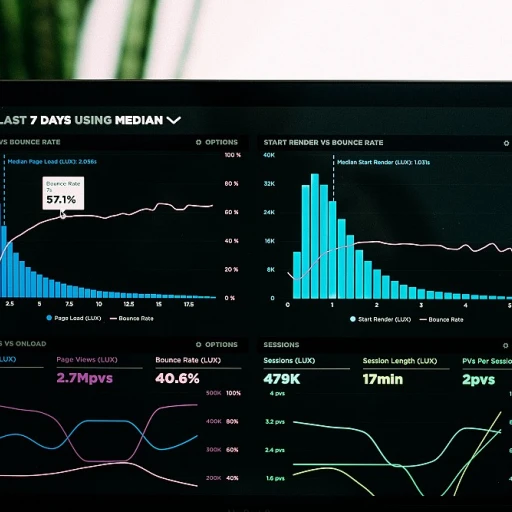
Understanding AI's Role in Information Sourcing
The Transformative Impact of Artificial Intelligence on Information Acquisition
In today's data-driven world, the effective sourcing of information is pivotal to optimizing search engine strategies. Businesses heavily rely on obtaining high-quality data from diverse sources to enhance their SEO outcomes. Artificial intelligence plays a critical role in this transformative process.
AI has revolutionized how companies manage their data sourcing strategies. With intelligent systems, businesses can streamline their strategic sourcing processes, ensuring they have access to the most relevant and quality data available. Instead of manual data collection—which is often time-consuming and prone to errors—AI leverages advanced data sourcing techniques such as web scraping, automation, and machine learning to gather insights efficiently.
The integration of artificial intelligence into the sourcing process empowers companies to make informed decisions regarding their supply chain, procurement, and overall business strategies. By harnessing effective data from credible sources, organizations can refine their goods and services strategy, ensuring they meet market demands while optimizing costs.
AI's role extends beyond merely collecting data; it also aids in analyzing and maintaining data quality. With the ability to filter and refine vast amounts of information, AI ensures that businesses only rely on high-quality, relevant data sources. This strategic sourcing enables improved decision-making and management across various sectors.
AI-Driven Content Curation
Navigating AI-Driven Curation for Optimized Information Sourcing
The implementation of artificial intelligence in curating content is transforming the way data is sourced and utilized by businesses. Leveraging AI's advanced capabilities, organizations are now able to streamline their sourcing process, ensuring the procurement of high-quality data and information from various sources. This, in turn, enhances the sourcing strategy, enabling companies to make informed decisions rapidly.
AI-driven content curation involves the use of algorithms and machine learning models to filter, organize, and present information in a way that aligns with strategic business goals. By automating the process of data collection and analysis, companies can save valuable time and resources, focusing instead on leveraging the insights gained from the curated data. This approach not only reduces costs associated with manual information sourcing but also elevates data quality, offering a competitive advantage in decision making and supply chain management.
Moreover, AI is adept at evaluating a vast array of data sources to source data effectively. By deploying web scraping tools powered by AI, businesses are empowered to extract secondary data across the internet, ensuring the information is timely and relevant. This fast-paced environment requires continuous adaptation and optimization of sourcing strategies to maintain the quality and integrity of the data supplied.
One noteworthy aspect of AI-driven content curation is its ability to process and analyze data from multiple sources, comparing and contrasting to filter out irrelevant information, and highlighting what is strategically important. This method allows for holistic business insights, enabling companies to refine their procurement processes and enhance goods and services delivery.
As we delve deeper into AI’s role in enhancing search engine optimization, it is evident that effective data curation and sourcing can significantly impact businesses. For a comprehensive understanding of AI's influence on SEO, explore how AI is shaping SEO content analysis.
Challenges in AI-Powered Information Sourcing
Overcoming Barriers in AI-Enhanced Information Sourcing
In the realm of SEO, incorporating AI-driven data sourcing presents its share of challenges. While the technology stands to revolutionize how businesses approach information gathering, there are obstacles that must be addressed to ensure effective data management and utilization.One of the significant issues is data quality. For companies looking to leverage AI in their SEO strategies, obtaining high-quality data is crucial. Poor data sourcing can lead to inaccurate insights, which in turn affect decision-making processes. Therefore, sourcing strategy must be tailored to prioritize high-quality data. By efficiently managing the sourcing process, businesses can ensure the data collected meets their standards, thus aligning it with their strategic goals.
Furthermore, the cost of implementing AI-powered information sourcing services can be prohibitive for some businesses. From procurement of sophisticated AI tools to the deployment of efficient data collection mechanisms, companies must invest significant resources. However, by carefully selecting and managing suppliers, strategic sourcing allows a company to optimize costs while acquiring necessary technology.
Additionally, the issue of data sourcing variety poses a challenge. AI systems extract information from multiple data sources, and thus, strategic planning is necessary to identify, assess, and integrate those sources efficiently. Companies need to establish a sourcing data framework that systematically evaluates available open data and secondary data sources. Through meticulous process management, businesses can curate a diversity of perspectives and insights, enhancing their supply chain of information.
Lastly, challenges in web scraping must be considered when sourcing data using AI. Ensuring compliance with legal and ethical standards is essential, as scraping can sometimes conflict with data privacy laws. It necessitates establishing protocols that define how data is sourced, processed, and stored, ensuring transparency and trust in the sourcing process.
Tackling these barriers can empower businesses to harness AI-driven data effectively, thereby optimizing their SEO strategies with accurate insights and a robust supply chain of information. For insights into enhancing SEO with AI, check out our strategies here.
Optimizing SEO Strategies with AI Insights
Leveraging AI Insights for Better SEO
When it comes to optimizing search engine optimization (SEO) strategies, leveraging artificial intelligence insights can make a significant impact. With AI enhancing data sourcing and management, businesses can refine their SEO campaigns effectively. AI helps in extracting high quality data from a variety of sources, enabling companies to tailor their content according to strategic sourcing needs. By procuring quality data from different sources, businesses can ensure that their SEO practices align with current trends and consumer demands. One way AI aids in optimization is through improved data collection and web scraping techniques. AI can efficiently source data, sifting through numerous data sources to provide reliable and high quality information. This ensures that the content used in SEO strategies is sourced from verified and effective data sources, enhancing the quality and relevance of business-specific insights. Moreover, AI can streamline the sourcing process, reducing the time and cost associated with manual sourcing efforts. It facilitates strategic decision making by providing insights data promptly, which can be pivotal in tailoring SEO strategies to better serve consumer inquiries. AI's capability to analyze and interpret large datasets means businesses can gain a deeper understanding of their target audience. This helps in crafting more precise and engaging content, which can significantly improve a company's search engine rankings. Incorporating AI-driven insights into SEO management empowers companies to remain competitive. It's not just about staying ahead; it's about incorporating a strategic sourcing strategy that combines high quality data with actionable insights for sustained SEO success.Case Studies: Successful AI Integration in SEO
Real-World Applications of AI in Enhancing SEO
As businesses increasingly turn to AI for SEO optimization, it's important to learn from successful examples where artificial intelligence has been effectively integrated. Companies across sectors are experiencing improvements in their search engine visibility, thanks in no small part to strategic data and information sourcing. One of the key strategies businesses are applying is AI-driven content curation. This enables them to source data and manage content that resonates with their target audiences, ensuring high-quality data is used in a way that enhances the user experience and search engine ranking. By leveraging AI for data sourcing, businesses can streamline their content development process, making it more efficient in terms of both time and cost. Several businesses have also harnessed AI for better decision making around data sources. By employing strategic sourcing techniques, organizations can ensure they are accessing the most relevant and effective data sources. This focus on quality data procurement helps in refining SEO strategies and is particularly useful when employing tools like web scraping for gathering secondary data. The sourcing strategy enterprises adopt is crucial for maintaining a competitive edge. By focusing on effective data collection, it's possible to build a robust supply chain of quality data, which in turn informs strategic decisions around goods and services offered. This process is beneficial not only for enhancing content curation and sourcing strategy but also for refining the overall SEO approach. Furthermore, AI technologies have proven incredibly useful in improving data management and integrating AI insights into SEO services. Companies using AI can deliver more tailored and effective optimization strategies, thus improving their position in search engine results. They accomplish this by analyzing patterns and trends within their data sourcing efforts, which leads to more informed decision making and higher data quality. By learning from these cases, organizations can better navigate the challenges that come with AI-powered information sourcing and develop an innovative sourcing process that supports their SEO objectives.Future Trends in AI and SEO
Emerging Trends in AI-Powered SEO
In the ever-evolving landscape of search engine optimization, the integration of artificial intelligence is rapidly transforming the way businesses approach SEO strategies. As companies continue to explore AI's potential, several key trends are emerging, offering insights into the future direction of this technology.- Advanced Data Sourcing: AI is playing a crucial role in enhancing data sourcing strategies. Businesses are utilizing AI to access high-quality, effective data from various sources, ensuring that their SEO strategies are built on accurate and relevant information. The use of AI in the data sourcing process is streamlining procurement, improving data quality, and reducing the cost and time associated with manual data collection.
- AI-Enhanced Decision Making: AI technologies are providing businesses with strategic insights that are not only improving the quality of decision making but also empowering companies to adopt more proactive sourcing strategies. By leveraging AI-derived insights, companies can offer more personalized and efficient goods and services, enhancing the overall user experience.
- Strategic Sourcing Through AI: The shift towards AI-driven strategic sourcing is reshaping the supply chain management of businesses. AI's ability to scrape the web and source data effectively is ensuring that companies can maintain a competitive edge by accessing a diverse range of data sources. This is particularly beneficial for companies aiming to optimize their sourcing data for SEO purposes.
- Focus on Data Quality and Management: As AI continues to integrate into SEO strategies, the emphasis on maintaining high data quality and effective data management is becoming increasingly prominent. Companies are investing in AI tools to manage data sourcing and procurement processes, ensuring that the data utilized is both reliable and actionable.













